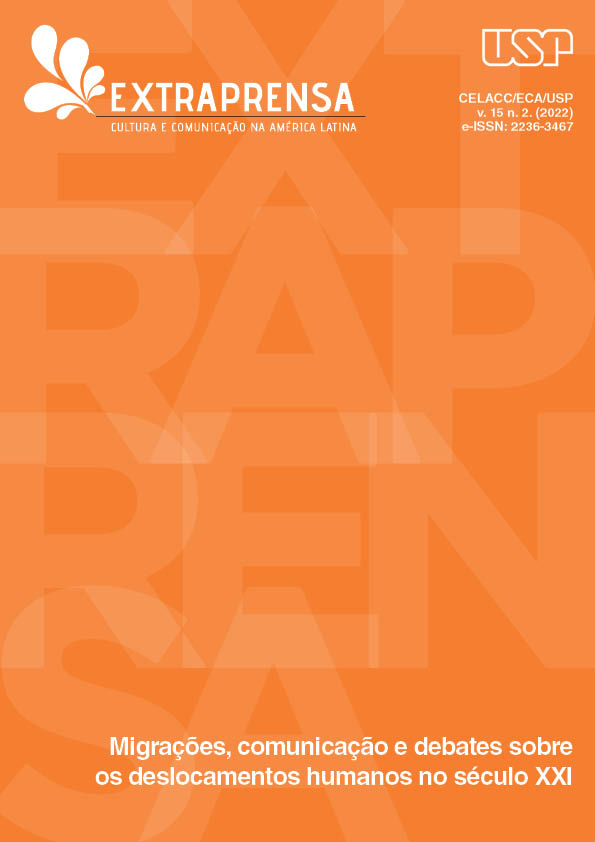Refugees and the olympic games: the media representation of the IOC's inclusion initiative at the Tokyo 2020 games
DOI:
https://doi.org/10.11606/extraprensa2022.199539Keywords:
Refuge, Representation, Media, Olympic GamesAbstract
Since Olympic Games Rio 2016, a team of refugee athletes has reminded the world of the contemporary humanitarian challenge and competes without carrying their own country's flag. The purpose of the article is to reflect on the initiative of the International Olympic Committee (IOC) to contribute to the inclusion and facilitate the process of integration of refugees into the host communities, based on the media representation of the Olympic refugee team's participation in the Olympic Games Tokyo 2020. The special sections of the newspapers O Globo and Folha de S.Paulo published during the mega sporting event held in 2021 will be qualitatively analyzed to identify how the “Other” is represented or even “forgotten”. After all, why include refugees in the Olympic Games? What is the meaning of this inclusion? To what extent do human rights narratives include to exclude, maintain prejudices and reproduce stereotypes?
Downloads
References
BOURDIEU, Pierre. Sobre a televisão. Trad. Maria Lúcia Machado. Rio de Janeiro: Jorge Zahar Ed., 1997.
CARTA OLÍMPICA. Comitê Olímpico Internacional. Suíça, 2021.
GATRELL, Peter. The Making of the Modern Refugee. In: Keynote address for conference on ‘Refugees in the Post-war World’, Arizona State University, 8-9 April, 2010. Disponível em: https://www.academia.edu/1691435/The_Making_of_the_Modern_Refugee. Acesso em: 22/6/2022.
HALL, Stuart. Cultura e representação. Org. Arthur Ituassu. Trad. Daniel Miranda e William Oliveira. Rio de Janeiro: Ed. PUC-Rio: Apicuri, 2016.
KRISTEVA, Julia. Estrangeiros para nós mesmos. Rio de Janeiro: Rocco, 1994.
MARX, Karl, ENGELS, Friedrich. A ideologia alemã. São Paulo. Boitempo, 2007.
PEDERSEN, Trine Norgaard. The Possibility of Refugee Participation Throughout Olympic History: A Discourse Analysis of the International Olympic Committee’s Discursive Construction of the Olympic Games. Dissertação (Mestrado). Aalborg University. Dinamarca, p. 58, 2018.
SIMMEL, Georg. O estrangeiro. Revista Brasileira de Sociologia da Emoção, 2005.
TOOHEY, Kristine; Veal A.J. The Olympic Games: A Social Science Perspective. Oxfordshire, UK: CABI, 2007.
Downloads
Published
Issue
Section
License
Copyright (c) 2022 Fernanda Paraguassu, Mohammed ElHajji

This work is licensed under a Creative Commons Attribution-NonCommercial-NoDerivatives 4.0 International License.
Ao submeter qualquer material científico para Extraprensa, o autor, doravante criador, aceita licenciar seu trabalho dentro das atribuições do Creative Commons, na qual seu trabalho pode ser acessado e citado por outro autor em um eventual trabalho, porém obriga a manutenção de todos os autores que compõem a obra integral, inclusive aqueles que serviram de base para o primeiro.
Toda obra aqui publicada encontra-se titulada sob as seguintes categorias da Licença Creative Commons (by/nc/nd):
- Atribuição (de todos os autores que compõem a obra);
- Uso não comercial em quaisquer hipóteses;
- Proibição de obras derivadas (o trabalho não poderá ser reescrito por terceiros. Apenas textos originais são considerados);
- Distribuição, exibição e cópia ilimitada por qualquer meio, desde que nenhum custo financeiro seja repassado.
Em nenhuma ocasião a licença de Extraprensa poderá ser revertida para outro padrão, exceto uma nova atualização do sistema Creative Commons (a partir da versão 3.0). Em caso de não concordar com esta política de Direito Autoral, o autor não poderá publicar neste espaço o seu trabalho, sob pena de o mesmo ser removido do conteúdo de Extraprensa.







